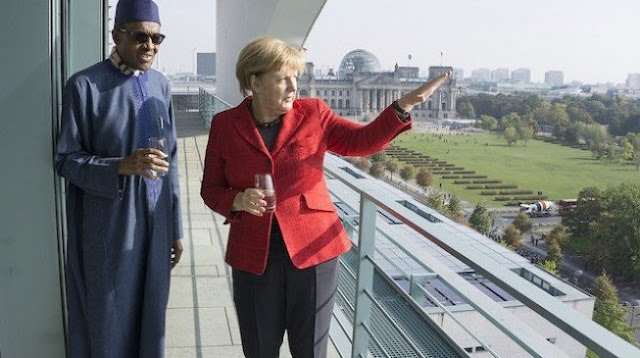Merkel made this disclosure during a joint press conference after a closed-door meeting with President Muhammadu Buhari, who had sought the assistance of the German government in intelligence gathering and training to tackle militancy in the Niger Delta region.
Buhari has recently been a vociferous campaigner for the rehabilitation of the Lake Chag region. When he received Irina Bokova, director-general of the United Nations Educational, Scientific and Cultural Organization (UNESCO) in Abuja in August, he appealed to developed nations to save Lake Chad from extinction as a result of the adverse effects of climate change.
“Those living in the Lake Chad region have suffered untold hardship and displacement because of the violence perpetrated by Boko Haram terrorists,” he had said.
“If there is no farming and fishing, they will dare the desert to migrate. Unless the developed countries make concerted efforts to complete the feasibility study, mobilise resources and technology to start the water transfer from the Congo Basin, Lake Chad will dry up.
“The people will go somewhere and they will create problems for those countries.”
On Friday, Merkel agreed that the Lake Chad region was of great priority to Germany, especially as Nigeria is a part of it.
“In terms of cooperation, we said we will earmark 18 billion for lake chad region area and 50 billion for the overall areas,” Merkel said.
“The Lake Chad region is in alarming situation; there are 11 million people displaced. Some of them are starving there; only 10 per cent of the Lake Chad left, which obviously erodes source of livelihood.
“The president has in his delegation the governor whose province is ravaged by Boko Haram; we are gratified to note that there have been progress in combating them.”
She lamented the complicated situation in Nigeria, due to issues like falling crude oil prices, unemployment and agitation in the Niger Delta.
She also talked about the migration partnership with the European Union, saying the EU want to negotiate migration with Nigeria.
“My point in this is that we need to see to it that human traffickers are out of business,” she said.
“We have to strengthen legal migration to also create jobs in Nigeria, jobs possibilities for vocational training, possibilities in education. Also in the context of migration partnership, we will also talk about readmission agreement.
“Germany has hundreds of people who will have to be returned to Nigeria and our first interest will be how to help the young people to get job or fine a job.”
Merkel commended Buhari’s effort in fighting crime and terrorism in Nigeria, saying: “You see first the successes of these policies and you also see great readiness of partners in ECOWAS and in the region to participate in this good fight and this good course.
“Today’s exchange made our relationship closer; there is great potential we still need to tape and particularly in this difficult time we want to stand by your side.
“Nigeria is the most populous country in Africa and has great potential for economic progress and this current crisis due to low oil price has to be overcome so that your GDP can be boosted and not remain in decline, as is the case right now.”








No comments:
Post a Comment